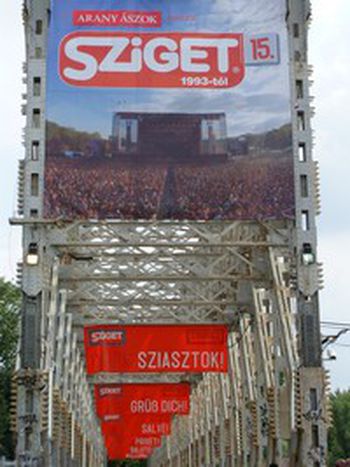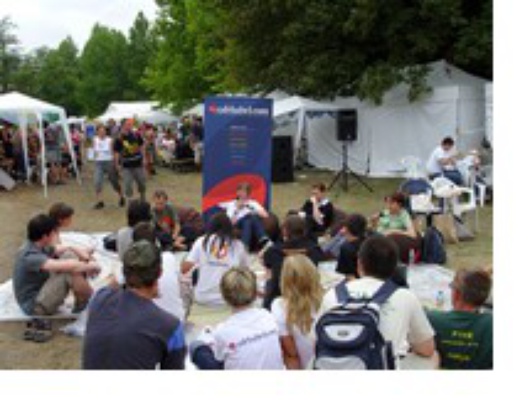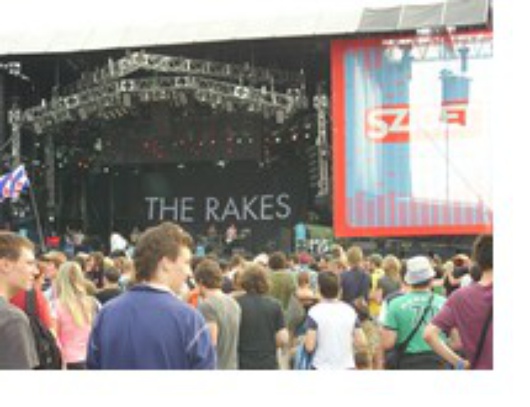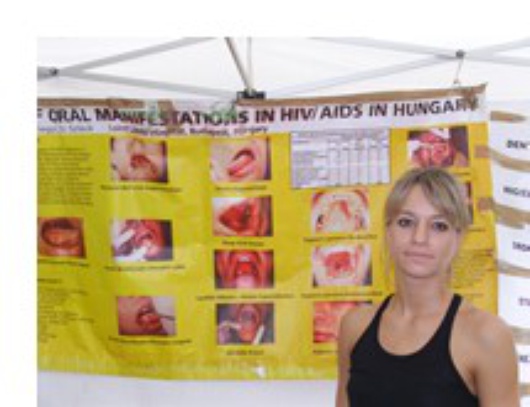
The other Sziget
Published on
Translation by:
Pink, Faithless, The Chemical Brothers, Nine Inch Nails; alongside more than 1, 000 musical events, young people show their commitment to the festival's 'Civil Village'. But for how much longer?
In Hungarian, the word 'Sziget' means island. Just next to 'Europa', the floating restaurant that bobs peacefully along the Danube, the shuttle-boat of the same name carries thousands of visitors every day to the festival on the island of Obuda in Budapest. The whole island buzzes with festivities for the week of 8-15 August. This year, Sziget is already celebrating its fifteenth anniversary. What was once a musical offensive for students in Budapest has transformed over the years into a large scale European event. In 2007, 371, 000 festival-goers partied outdoors. 40,000 of those came from all corners of Europe.
Contrary to Robinson-Crusoe-types, here the shipwrecked voluntarily embark for a week on the island to celebrate in the communal utopia of music. Even if most of the visitors are attracted to Budapest by its big name headliners – and low cost fares - Sziget is unique in its genre, offering 20 different stages for more than 600 groups and artists. The festival programme offers a complete range from rock, electro, punk, hip-hop, reggae, jazz to gypsy sounds.
 There's also another side to Sziget at the heart of the festival. Each year, a small insular colony forms to the left of the main stage, behind the Guinness podium. 'It's what we call the 'Civil Village,' remarks Yves, a 22-year-old originally from the French northwestern city of Rennes. As he comes out from the Jewish tent, he declares that after three days, he's had 'almost enough' of the ongoing excitement at the festival. 'The Civil Village is perfect for relaxing in the afternoon.'
There's also another side to Sziget at the heart of the festival. Each year, a small insular colony forms to the left of the main stage, behind the Guinness podium. 'It's what we call the 'Civil Village,' remarks Yves, a 22-year-old originally from the French northwestern city of Rennes. As he comes out from the Jewish tent, he declares that after three days, he's had 'almost enough' of the ongoing excitement at the festival. 'The Civil Village is perfect for relaxing in the afternoon.'
Those worn out after mud-fighting, bungee jumping, climbing beer crates, shopping or simply drinking, can follow various debates about Europe and its political scene, experiment with pottery, play chess, find out about different NGOs or simply mill around with the other people who have came from all over Europe: long live Sziget!
The settlers of Obuda
 Young people listen to the likes of London indie band The Rakes rocking the main stage from the comfort of their white tents, which are lined up inside the Civil Village. 'The visitors at Sziget constitute our target exactly. People come from all over - Germany, France and Slovenia. They reach us here easily,' says Melinda Pataki, 28, who works for the '2007 European Year of Equal Opportunities for All' information campaign at the European Commission. Pataki explains that there is a huge lack of information in Hungary with regards to the integration of the Roma minority.
Young people listen to the likes of London indie band The Rakes rocking the main stage from the comfort of their white tents, which are lined up inside the Civil Village. 'The visitors at Sziget constitute our target exactly. People come from all over - Germany, France and Slovenia. They reach us here easily,' says Melinda Pataki, 28, who works for the '2007 European Year of Equal Opportunities for All' information campaign at the European Commission. Pataki explains that there is a huge lack of information in Hungary with regards to the integration of the Roma minority.
Nevertheless, music doesn't have any borders, as demonstrated by the silent motto of the Sziget Festival. Kinga Pupos is of the same opinion. She is in charge of communication for the monthly Roma magazine AmaroDrom ('My Way'). 'Our magazine is mostly recognised for its political and cultural aspects of Roma culture in Hungary and Europe,' she explains excitedly as she sits on one of the numerous cushions in her tent.  Pulling out the latest edition of the magazine, she shows us the colourful poster that decorates the tent. 'We're not just criminals and thieves; we're also doctors and journalists.' This is the message she wants to pass onto the youth at the festival. According to her, Europe should be open to Roma culture; that is what she's hoping for most of all. Sziget represents one step in that direction. There is even a Roma stage pointing towards the end of the island, where Ukrainian group Técsi Banda will play on Saturday night. Later, French gypsy guitarist Yorgui Loeffler will also be performing.
Pulling out the latest edition of the magazine, she shows us the colourful poster that decorates the tent. 'We're not just criminals and thieves; we're also doctors and journalists.' This is the message she wants to pass onto the youth at the festival. According to her, Europe should be open to Roma culture; that is what she's hoping for most of all. Sziget represents one step in that direction. There is even a Roma stage pointing towards the end of the island, where Ukrainian group Técsi Banda will play on Saturday night. Later, French gypsy guitarist Yorgui Loeffler will also be performing.
On a road lying just off the island, the cafébabel.comBudapest team encourage people to put their fears regarding Europe onto paper and pinboard, before they wander off to explore other banks and concerts. Beer in hand, everyone mingles in the crowd as night falls.
Booze it up until the doctor comes
This is how it will be from now on. Doctors are already in place as part of the Civic Village. Its hard to imagine, but all the tables in the Richter intima.hu tent are being used.  Young women fill out application cards. The gynaecological exams and all the information on personal hygiene are a total success. 'The generation that comes to Sziget know practically nothing about sex, but we're there for afterwards. It's a big problem in Hungary,' PR officer Réka Etelka Vaskó-Horváth explains, wearing a t-shirt with the word LOVE etched in pink letters. 'Our doctor,' she gestures to the back room, 'is a young, casually dressed guy, who really knows his stuff about people here.' Every day, young women come here in search of the morning-after pill. 'Condoms are distributed only sparingly,' complains Vaskó-Horváth, shrugging her shoulders.
Young women fill out application cards. The gynaecological exams and all the information on personal hygiene are a total success. 'The generation that comes to Sziget know practically nothing about sex, but we're there for afterwards. It's a big problem in Hungary,' PR officer Réka Etelka Vaskó-Horváth explains, wearing a t-shirt with the word LOVE etched in pink letters. 'Our doctor,' she gestures to the back room, 'is a young, casually dressed guy, who really knows his stuff about people here.' Every day, young women come here in search of the morning-after pill. 'Condoms are distributed only sparingly,' complains Vaskó-Horváth, shrugging her shoulders.
 A few meters on, free AIDS tests are being offered. There's even a long line of visitors waiting 'for free condoms!' Nearby, Dr. Alexa Per Ger's dentist's chair sits empty, but she assures us that every day 'somewhere between 40 and 50 festival-goers' come and bare their teeth. Apparently, the Scandinavians have the best pearls in Europe by far, followed by the Hungarians and Latvians.
A few meters on, free AIDS tests are being offered. There's even a long line of visitors waiting 'for free condoms!' Nearby, Dr. Alexa Per Ger's dentist's chair sits empty, but she assures us that every day 'somewhere between 40 and 50 festival-goers' come and bare their teeth. Apparently, the Scandinavians have the best pearls in Europe by far, followed by the Hungarians and Latvians.
Tendency to step back?
Be it the medical supervision, the debates on the news, NGO presentations or local initiatives: along with the musical events, the Civil Village proposes various activities, always free of cost. György Ligeti of the Kurt Lewin Foundation confirms that the Sziget festival is unique in Europe because of its role in promoting tolerance and civic action. 'Unfortunately, certain NGOs weren't able to get a free pass for entry for the island this year,' says Erika Hasznos, from the Hungarian Ministry for the Environment and Water, who during the debate mentions that she had received an invitation. Indeed, the 2007 edition of Sziget was financed without any governmental subvention for the first time ever. This year, the citizens' organisations paid four-fifths the cost of the entry ticket from their own pockets. One week on the island costs about 120 euros per person in total.
Will the galloping commercialisation of the festival deprive it of its soul? In fact, musical events during the summer have become a considerable source of revenue for the organisers. Swiss audit society KPMG estimates that figures at Sziget will increase by more than 54 millions dollars by 2010. At this year's Glastonbury festival in the south of England, people relaxed in luxury tents, drank champagne, called on the services of masseuses and even rented private helicopters. The open-air sector is in full growth, and visitors are willing to pay the price. Nevertheless, many events, like the ones at Roskilde in Denmark or the Fête de l'Humanité in Paris, hope to conserve the original character of their festivities: music, tolerance, and politics. Perhaps even if things are a bit wild and uncivilised – but nothing more. Next year, we'll see if the grasshoppers will invade the Civil Village in Budapest, or if the Sziget festival will become known for having preserved a bit of Woodstock spirit.
Translated from Das andere Sziget



